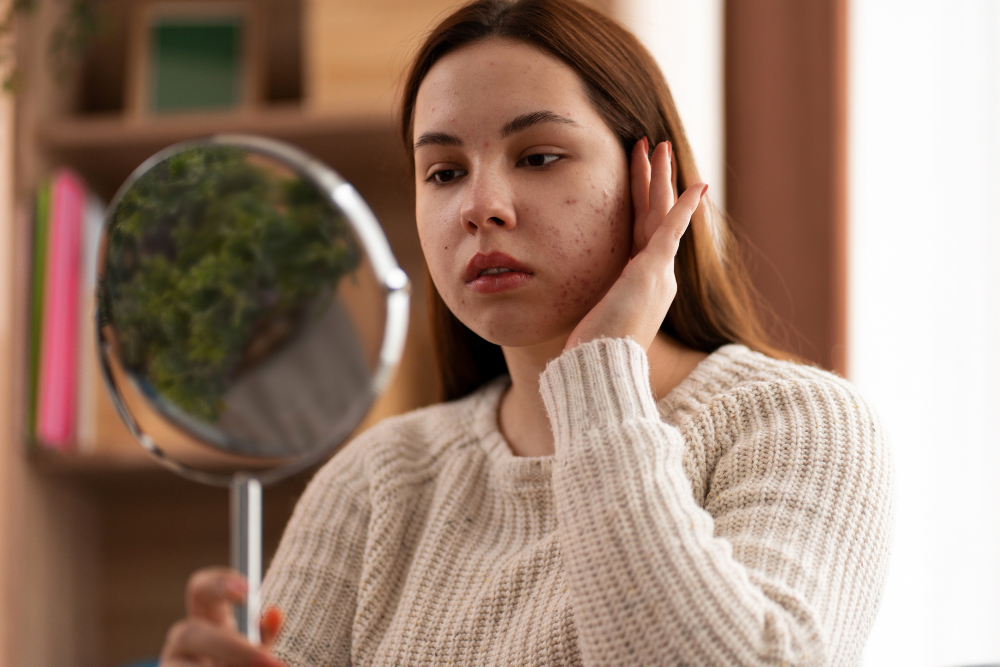Oily, acne-prone skin can be challenging to manage, often leading to frequent breakouts, enlarged pores, and a greasy complexion. However, with the right skincare routine and targeted remedies, you can effectively address these concerns and achieve clearer, healthier skin. In this blog, we’ll explore a variety of remedies specifically tailored for oily, acne-prone skin to help you regain control over your skincare journey.
Here are some effective remedies and tips:
1. Gentle Cleansing:
Proper cleansing is essential for oily, acne-prone skin to remove excess oil, dirt, and impurities that can clog pores and contribute to breakouts. Opt for a gentle, non-comedogenic cleanser formulated specifically for oily or acne-prone skin. Look for ingredients like salicylic acid or benzoyl peroxide, which can help unclog pores and reduce acne-causing bacteria without stripping the skin of its natural oils. Cleanse your face twice daily, morning and night, to maintain a clean canvas for your skincare products.
2. Salicylic Acid Treatment:
Salicylic acid is a beta hydroxy acid (BHA) known for its ability to penetrate deep into the pores, exfoliate dead skin cells, and unclog pores. Incorporating a salicylic acid treatment into your skincare routine can help regulate oil production, prevent acne breakouts, and improve skin texture. Choose a salicylic acid-based serum, toner, or spot treatment to target oily and acne-prone areas, but be cautious not to overuse it, as it can cause dryness and irritation with excessive use.
3. Oil-Free Moisturizer:
Contrary to popular belief, oily skin still needs hydration to maintain balance and prevent excess oil production. However, it’s crucial to choose a lightweight, oil-free moisturizer specifically formulated for oily or acne-prone skin. Look for non-comedogenic ingredients like hyaluronic acid, glycerin, or dimethicone, which provide hydration without clogging pores or feeling heavy on the skin. Apply a dime-sized amount of moisturizer to your face and neck after cleansing to keep your skin hydrated and balanced throughout the day.
4. Clay Masks:
Clay masks are a fantastic remedy for oily, acne-prone skin as they help absorb excess oil, unclog pores, and reduce inflammation. Look for clay masks containing ingredients like kaolin, bentonite, or charcoal, which have powerful oil-absorbing properties. Use a clay mask once or twice a week to purify and detoxify your skin, leaving it feeling refreshed and mattified. Avoid leaving the mask on for too long to prevent excessive drying or irritation, and always follow up with a hydrating moisturizer.
5. Tea Tree Oil Spot Treatment:
Tea tree oil is a natural remedy with antimicrobial and anti-inflammatory properties, making it an excellent spot treatment for acne-prone skin. Dilute tea tree oil with a carrier oil like coconut oil or jojoba oil, then apply a small amount directly to active breakouts using a cotton swab. Tea tree oil helps reduce redness, inflammation, and acne-causing bacteria, promoting faster healing and preventing future breakouts. Be sure to perform a patch test before using tea tree oil to ensure you don’t experience any adverse reactions.
6. Sun Protection:
While it may seem counterintuitive, sun protection is essential for oily, acne-prone skin. Exposure to UV rays can exacerbate acne and inflammation, leading to post-inflammatory hyperpigmentation (PIH) and premature aging. Choose a lightweight, non-comedogenic sunscreen with an SPF of 30 or higher, and apply it generously to your face and any exposed areas every morning, regardless of the weather. Look for sunscreens labeled “oil-free” or “non-greasy” to avoid exacerbating oiliness.
Conclusion:
Managing oily, acne-prone skin requires a combination of targeted remedies, consistent skincare habits, and patience. By incorporating gentle cleansing, salicylic acid treatments, oil-free moisturizers, clay masks, tea tree oil spot treatments, and sun protection into your skincare routine, you can effectively control excess oil production, prevent acne breakouts, and achieve a clearer, healthier complexion. Remember to listen to your skin’s needs, adjust your routine as necessary, and seek professional advice if you experience persistent or severe acne symptoms. With dedication and the right approach, you can embrace your skin’s natural beauty and feel confident in your skincare journey.

